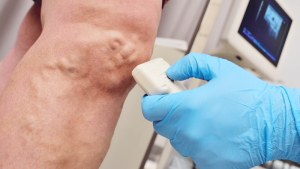Vein Treatments for Varicose & Spider Veins
Varicose vein and spider vein treatments may relieve pain and discomfort, improve the appearance of your legs, and prevent bleeding and superficial clots. When left untreated, varicose veins can cause venous stasis dermatitis and ulceration (reddish-brown pigmentation, swelling, and leathery skin), leading to DVT.
Vein treatments vary based on diagnosis but understanding the types of vein treatments are available can help you understand your next steps.
Let’s explore non-surgical vein treatment options.
Types of Vein Treatments and Procedures
Vein disease happens when the tiny valves that keep blood flowing in the right direction become damaged, impairing blood circulation in a part of the body, usually the legs. Vein treatments can help restore proper blood blood blow.
At USA Vein Clinics, our vein specialists offer a range of minimally invasive, office-based treatments that can quickly alleviate vein-related pain and discomfort. Minimally invasive vein treatments provide lasting relief with greater convenience and a lower risk of complications compared to vein surgery.
Vein Treatments Offered by USA Vein Clinics:
Endovenous Laser Therapy (EVLT)
- Purpose: Treat varicose veins and chronic venous insufficiency.
- How It Works: A laser fiber is inserted into the vein, delivering energy to close off the affected veins and redirect blood flow to healthier veins.
- Recovery: Local anesthesia, minimal downtime, some bruising or soreness.
ClariVein® Treatment
- Purpose: Treats varicose veins.
- How It Works: Combines mechanical and chemical ablation.
- Recovery: Quick procedure with minimal downtime.
Varithena Vein Treatment
- Purpose: Treats varicose veins.
- How It Works: Foam sclerosant is injected into the vein under ultrasound guidance.
- Recovery: Minimal downtime, may require multiple sessions.
VenaSeal™ Treatment
- Purpose: Closure of varicose veins.
- How It Works: Medical adhesive is used to close the vein.
- Recovery: No need for compression stockings post-procedure, minimal downtime.
Radiofrequency Ablation (RFA) Treatment
- Purpose: Treats varicose veins
- How It Works: A catheter is inserted into the vein, and radiofrequency energy is used to heat and close the vein.
- Recovery: Local anesthesia, quick recovery, minimal pain.
Ultrasound-Guided Sclerotherapy
- Purpose: Treats moderate to severe varicose veins and venous insufficiency.
- How It Works: An ultrasound is used to inject a sclerosant into the vein, causing it to collapse and redirect blood flow to healthy veins.
- Recovery: Minimal discomfort; no scarring. Most patients can resume light activities the same day.
Visual Sclerotherapy
- Purpose: Treat small to medium-sized varicose and spider veins.
- How It Works: A solution is injected into the vein, causing it to scar and close. Blood reroutes through healthier veins.
- Recovery: Minimal downtime; some bruising and swelling may occur.
Relief is a Click Away – Book a Consultation Now
Benefits of Vein Treatment
After vein treatment, you can look forward to:
- Less pain, if any
- Less swelling, if any
- The ability to stand for longer periods of time
- The ability to walk greater distances
- Reduced risk of serious venous complications
- Decreased vein visibility
- Improved quality of life
Who Can Benefit from Treatment?
Leg vein treatment can benefit a wide range of individuals. If you’re experiencing symptoms of vein disease, minimally invasive treatments offer a quick and effective option with little recovery time. These treatments are designed to fit into busy lifestyles and can help improve your quality of life.
Schedule an initial consultation with one of our vein specialists to explore your options and find out if vein treatment is right for you.
What to Expect During Vein Treatment
Vein Consultation
During a consultation at USA Vein Clinics, your doctor will perform a physical exam and evaluate your leg veins for signs of vein disease. Every patient’s condition is unique, and the consultation helps your doctor determine the best approach for diagnosis and treatment. The consultation is also an opportunity to ask questions and learn more about your vein health and treatment procedures.
Diagnosis
Recommendations for leg vein treatment are made based on your individual symptoms, medical history, and the severity of your condition. Some may experience visible veins with no discomfort, while others might have pain, heaviness, or swelling with no obvious external signs. This is why accurate diagnosis is so important— it ensures that your treatment plan is customized to your specific condition and needs, addressing both visible and underlying issues.
For our advice on getting ready for your appointment, read our guide on preparing for your visit.
Vein Treatment Options at USA Vein Clinics
Visiting a vein specialist is the best way to know if vein treatment is right for you. At USA Vein Clinics, our expert vein doctors can diagnose your condition and help you choose a treatment plan that will address your individual needs.
To get started on your journey towards better vein health, schedule an appointment online today or call 888.768.3467.
Frequently Asked Questions About Vein Treatments
How much does vein treatment cost?
The cost depends on the type of treatment performed and insurance coverage. Our vein treatment centers participate with most insurers, including Medicare and some Medicaid plans. We also have affordable payment options for out-of-pocket costs. You can verify insurance eligibility in real-time using our online scheduling tool.
What are the benefits of vein treatment?
Vein treatment is not just a cosmetic procedure. In addition to reducing the appearance of varicose and spider veins, it can alleviate symptoms related to vein disease, including pain, tired limbs, and swelling. These treatments also reduce the risk of vein disease complications, like venous ulcers and DVT.
What is the best vein treatment?
The best treatment for each individual depends on their specific health needs. Some of the most common minimally invasive vein treatments are endovenous laser vein treatment (EVLT) or sclerotherapy. However, all non-surgical vein treatments offered at USA Vein Clinics are convenient and significantly improve symptoms.

